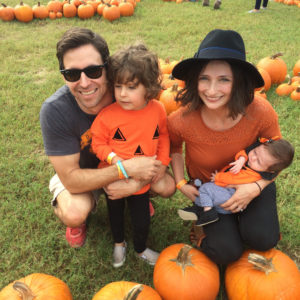Austin couple takes an innovative, integrated approach with IVF and acupuncture
 Melissa met Andrew after she graduated from the University of Texas with her bachelor’s and master’s degrees. They married and planned to have a family, but encountered setbacks and challenges along their journey, including recurrent miscarriage, an ectopic pregnancy, an emergency C-section and low AMH levels (egg supply). After months of heartbreaking loss, the couple gave birth to their first baby, Kemett, nearly three years ago.
Melissa met Andrew after she graduated from the University of Texas with her bachelor’s and master’s degrees. They married and planned to have a family, but encountered setbacks and challenges along their journey, including recurrent miscarriage, an ectopic pregnancy, an emergency C-section and low AMH levels (egg supply). After months of heartbreaking loss, the couple gave birth to their first baby, Kemett, nearly three years ago.
The doctors knew immediately that something was wrong, and Kemett would spend his first three weeks in the NICU, diagnosed with Prader-Willi syndrome (PWS), a rare genetic disorder that occurs on the 15th chromosome and is associated with abnormal growth, metabolism and cognitive function. Today, Kemett has low muscle tone. When he gets older, he will also experience an insatiable hunger and will struggle to maintain a normal weight.
His energetic mom spearheads fundraisers for the syndrome, drives Kemett to therapy six days a week and travels to see a specialist every year in Gainesville, Florida. She also began trying to get pregnant again. Like many parents with PWS children, the couple wanted to make sure Kemett had a sister or a brother there for him should something happen to them.
When Kemett was 1 year old, Melissa found out she was pregnant. Even after a sonogram, she was unaware of a dangerous condition until she found herself in emergency surgery with an ectopic pregnancy and her fallopian tube “close to bursting.”
Dr. Natalie Burger coordinated care to incorporate IVF and acupuncture
After that ordeal, Melissa sought out an acupuncturist to help her heal. Sage Acupuncture, located in the same office complex as our South Austin fertility center, also treated Melissa for abnormal thyroid levels. Testing with a new obgyn practice revealed a low AMH level that was inconsistent with her age.
At that point, she opted to see a specialist, a reproductive endocrinologist that her friend had recommended. Dr. Natalie Burger ordered a hysterosalpingogram (also known as an HSG or dye test) and concluded that the previously damaged fallopian tube was indeed blocked.
“We could do surgery to open up the blocked tube or proceed to IVF,” Melissa said. “I was worried that if we did surgery, it wouldn’t work…and I was getting older.”
A “heartbreaking” response to ovarian stimulation
Egg retrieval during IVF resulted in only five eggs. “I already knew I was going to have a low number, but it was heartbreaking,” she said.
Andrew and Melissa opted for genetic testing on their resulting three embryos. They had a less than 1% chance of passing on the gene for PWS, so they were not searching for inheritable disease. It was their history of miscarriage that led to the decision to have preimplantation genetic screening, PGS, to examine each embryo for its number of chromosomes.
Having too few or too many chromosomes, or misplaced chromosomes, is a leading cause of early pregnancy loss. Fortunately, all three embryos were chromosomally normal.
“We waited a month and scheduled IVF and acupuncture the day before and the day after the transfer,” Melissa said.
It had been a busy month, with a national conference and walk for the Foundation for Prader-Willi Research taking place in Austin, and Melissa played a large role in that event. Unfortunately, the IVF cycle was unsuccessful, and Melissa says it was hard to think about the fact that they only had two embryos left.
Dr. Burger scheduled an ultrasound to check Melissa’s uterus because she had noticed some resistance in threading the catheter through for the transfer. A history of C-section could lead to scar tissue, but the test was clear. Dr. Burger also recommended switching from suppositories to injectable progesterone.
Melissa was cautiously optimistic
The second IVF transfer was successful. “I was shocked when my nurse (at TFC) called me,” Melissa said. “I was very emotional, and my husband and I were cautiously optimistic.”
When she was released to her obgyn, she said she felt nervous and scared. “You’ve been monitored so closely, and I liked that because of my history. I was so happy with how things went with Dr. Burger. She is so smart, and I felt like I was in very good hands with her.”
Melissa continued progesterone shots for 10 weeks, had weekly acupuncture visits for 12 weeks, and then again from her 34th week until she went into labor.
Coordinating IVF and acupuncture was easier because her fertility specialist and acupuncturist had a good working relationship.
Welcome, Mabel Grace
This pregnancy was different, Melissa said, because the baby was moving more, and she was feeling sick. She believes that acupuncture helped her with infertility, anxiety and nausea, and prepared her for a successful vaginal birth after C-section at 41 weeks. She adds that her acupuncturist asked questions about her thyroid imbalances that other doctors had missed.
The couple welcomed a baby girl, Mabel Grace, into the family. Katie, one of her acupuncturists, was by her side during labor and delivery.
Today, this mother of two small children continues to raise awareness for PWS, while also helping women dealing with infertility understand their options. To schedule a consultation with Dr. Burger at our South Austin fertility clinic, or to learn more about IVF and acupuncture, please contact us here.














Comments are closed.